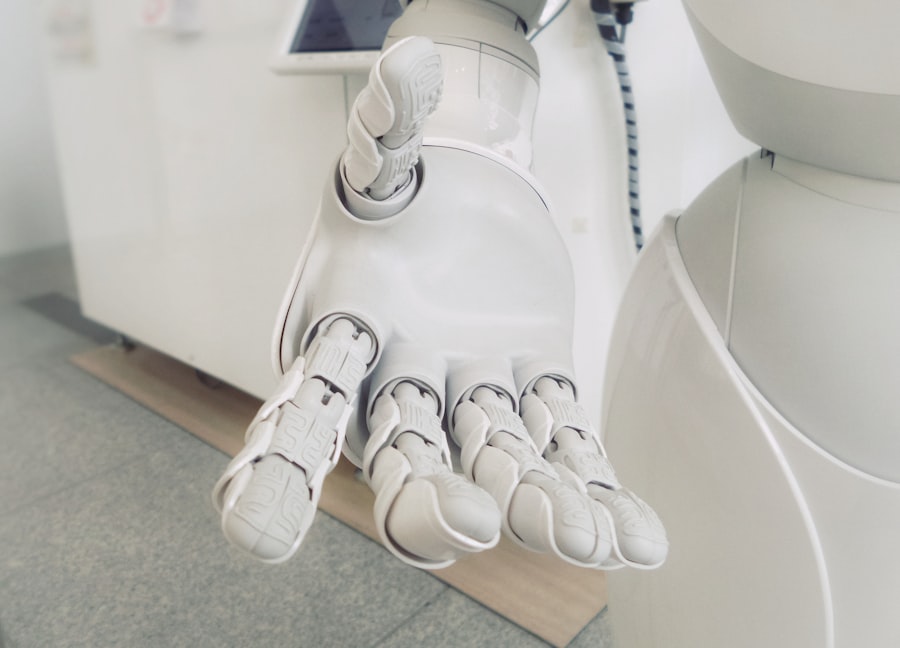In recent years, the concept of impromptu has emerged as a transformative force in the realm of artificial intelligence, reshaping how we engage with technology and, by extension, with one another. Impromptu refers to the spontaneous and unplanned interactions facilitated by AI systems that can adapt to human needs in real-time. This evolution is not merely a technological advancement; it represents a profound shift in our relationship with machines.
As AI systems become increasingly capable of understanding and responding to human emotions, preferences, and contexts, they amplify our inherent humanity rather than diminish it. This phenomenon is particularly evident in creative fields, where AI tools are being used to inspire and enhance human creativity rather than replace it. The rise of impromptu is characterized by a growing recognition that technology should serve as an extension of human capabilities.
For instance, artists and musicians are now using AI to generate ideas, explore new styles, and push the boundaries of their creativity. This collaborative approach fosters a dynamic interplay between human intuition and machine learning, resulting in innovative outcomes that neither could achieve alone. As we embrace this new paradigm, it becomes clear that the future of AI lies not in its ability to replicate human thought but in its capacity to enhance our unique qualities, allowing us to express ourselves more fully and authentically.
Key Takeaways
- Impromptu AI is amplifying human creativity and innovation, changing the way we interact with AI, and bridging the gap between humans and machines.
- Reid Hoffman envisions AI as a tool to enhance human potential, emphasizing the importance of ethical considerations and the future of work.
- GPT-4 plays a crucial role in Impromptu, enabling more natural and human-like interactions with AI.
- Impromptu has the potential to impact society by revolutionizing the way we work, interact with technology, and overcome challenges and risks in its implementation.
- Embracing the power of Impromptu can lead to a better future by amplifying human potential and fostering a more ethical and innovative society.
Reid Hoffman’s Vision for AI and Humanity
Reid Hoffman, co-founder of LinkedIn and a prominent figure in the tech industry, has articulated a vision for AI that emphasizes its potential to augment human capabilities rather than replace them. He posits that the future of AI should be rooted in collaboration, where machines act as partners in our endeavors rather than mere tools. Hoffman’s perspective aligns with the principles of impromptu, as he advocates for systems that can learn from human interactions and adapt accordingly.
Hoffman’s insights extend beyond mere functionality; they delve into the ethical implications of AI development. He argues that as we create more sophisticated systems, we must also consider the societal impact of these technologies.
The challenge lies in ensuring that AI serves the greater good, promoting inclusivity and accessibility while minimizing potential harms. By prioritizing human-centric design and ethical considerations, Hoffman envisions a future where AI enhances our collective intelligence and creativity, paving the way for a more connected and empathetic society.
The Role of GPT-4 in Impromptu

At the forefront of the impromptu movement is GPT-4, an advanced language model developed by OpenAI that exemplifies the capabilities of modern AI. This model is designed to understand and generate human-like text based on context, making it an invaluable tool for spontaneous interactions. GPT-4’s ability to engage in natural language conversations allows users to explore ideas, brainstorm solutions, and collaborate on projects in real-time.
Its versatility makes it applicable across various domains, from education to entertainment, where it can serve as a catalyst for creativity and innovation. The integration of GPT-4 into impromptu interactions highlights its potential to transform how we communicate with machines. For example, educators can leverage GPT-4 to create personalized learning experiences for students, adapting content based on individual needs and preferences.
Similarly, writers can use the model to overcome creative blocks by generating prompts or suggesting alternative narratives. This dynamic interaction not only enhances productivity but also fosters a sense of partnership between humans and AI, reinforcing the idea that technology can amplify our capabilities rather than constrain them.
How Impromptu is Changing the Way We Interact with AI
The advent of impromptu has fundamentally altered our interactions with AI systems, shifting from rigid command-and-response models to more fluid and conversational exchanges. This evolution is evident in various applications where users can engage with AI in a manner that feels intuitive and natural. For instance, virtual assistants powered by advanced AI can now understand context and nuance, allowing for more meaningful conversations that go beyond simple queries.
This shift encourages users to explore the full potential of AI as a collaborative partner rather than a passive tool. Moreover, the rise of impromptu has democratized access to advanced technologies. Individuals from diverse backgrounds can now engage with AI systems without needing extensive technical knowledge.
This accessibility fosters creativity and innovation across various fields, empowering people to harness AI’s capabilities for their unique purposes. As a result, we are witnessing a cultural shift where technology is increasingly viewed as an ally in our creative endeavors, enabling us to express ourselves more freely and authentically.
The Ethical Implications of Impromptu
As with any technological advancement, the rise of impromptu brings forth significant ethical considerations that must be addressed. One primary concern revolves around data privacy and security. As AI systems become more integrated into our daily lives, they collect vast amounts of personal information to enhance their functionality.
This raises questions about how this data is used, stored, and protected. Ensuring transparency and accountability in data handling practices is crucial to maintaining user trust and safeguarding individual privacy. Another ethical implication pertains to the potential for bias in AI-generated content.
If not carefully managed, AI systems can inadvertently perpetuate existing stereotypes or reinforce societal inequalities. It is essential for developers to implement robust measures that mitigate bias in training data and algorithms. By prioritizing fairness and inclusivity in AI design, we can harness the power of impromptu while minimizing its risks.
Engaging diverse voices in the development process will further ensure that these technologies reflect a broad spectrum of perspectives and experiences.
Amplifying Human Creativity and Innovation with Impromptu

Impromptu serves as a powerful catalyst for amplifying human creativity and innovation across various domains. By facilitating spontaneous interactions between humans and AI, it encourages individuals to explore new ideas and push the boundaries of their creative potential. For instance, musicians are increasingly collaborating with AI tools to compose original pieces or remix existing works, resulting in innovative sounds that challenge traditional genres.
This collaborative approach not only enriches the artistic landscape but also fosters a sense of community among creators who share their experiences and insights. In addition to the arts, impromptu is transforming fields such as science and technology by enabling rapid experimentation and ideation. Researchers can leverage AI-driven platforms to analyze vast datasets or simulate complex scenarios, accelerating the pace of discovery.
This synergy between human intuition and machine intelligence allows for breakthroughs that would be difficult to achieve through traditional methods alone. As we embrace this collaborative spirit, we unlock new avenues for innovation that have the potential to address some of society’s most pressing challenges.
Impromptu and the Future of Work
The integration of impromptu into the workplace is reshaping how we approach collaboration and productivity. As organizations increasingly adopt AI-driven tools, employees are finding new ways to leverage these technologies to enhance their work processes. For example, teams can utilize AI-powered brainstorming platforms that facilitate real-time idea generation and feedback, fostering a culture of innovation within organizations.
This shift towards collaborative problem-solving not only boosts efficiency but also empowers employees to take ownership of their contributions. Moreover, impromptu is redefining traditional roles within organizations by encouraging cross-disciplinary collaboration.
This collaborative environment nurtures creativity and fosters a sense of belonging among employees, ultimately leading to higher job satisfaction and retention rates. As we look toward the future of work, it is clear that embracing impromptu will be essential for organizations seeking to thrive in an increasingly competitive landscape.
Impromptu: Bridging the Gap Between Humans and Machines
Impromptu represents a significant step toward bridging the gap between humans and machines by fostering more meaningful interactions between the two. Traditional interfaces often create barriers that hinder effective communication; however, impromptu encourages fluid exchanges that feel natural and intuitive. This shift is particularly important as we navigate an increasingly digital world where technology plays an integral role in our lives.
By prioritizing user experience and emotional intelligence in AI design, developers can create systems that resonate with users on a deeper level. For instance, chatbots equipped with advanced natural language processing capabilities can engage users in conversations that feel personal and empathetic. This approach not only enhances user satisfaction but also cultivates trust between humans and machines—a crucial factor as we rely more heavily on technology for various aspects of our lives.
The Potential Impact of Impromptu on Society
The societal implications of impromptu are profound, as this movement has the potential to reshape how we interact with technology on a daily basis. By fostering spontaneous collaboration between humans and AI, we can create environments that encourage creativity, innovation, and inclusivity. This shift could lead to a more engaged citizenry capable of leveraging technology for positive change within their communities.
Furthermore, as impromptu becomes more prevalent across various sectors—education, healthcare, business—it has the potential to democratize access to knowledge and resources. Individuals from diverse backgrounds can harness AI tools to enhance their skills or pursue new opportunities without facing traditional barriers. This democratization could lead to greater social mobility and empowerment for marginalized groups, ultimately contributing to a more equitable society.
Overcoming Challenges and Risks in Implementing Impromptu
While the promise of impromptu is significant, several challenges must be addressed to ensure its successful implementation across various domains. One major hurdle lies in ensuring that users are equipped with the necessary skills to engage effectively with AI systems. As technology continues to evolve rapidly, there is a risk that certain populations may be left behind if they lack access to training or resources needed to navigate these tools confidently.
Additionally, organizations must grapple with concerns related to data security and privacy as they integrate AI into their workflows. Striking a balance between leveraging data for improved functionality while safeguarding user information will be critical in maintaining trust among stakeholders. Developing robust policies around data usage will be essential for mitigating risks associated with implementing impromptu technologies.
Embracing the Power of Impromptu for a Better Future
As we stand on the brink of an era defined by impromptu interactions between humans and machines, it is imperative that we embrace this transformative potential for a better future. By prioritizing collaboration over competition—both among individuals and between humans and AI—we can cultivate environments that foster creativity, innovation, and inclusivity. The journey ahead will require us to navigate ethical considerations thoughtfully while ensuring equitable access to these powerful tools.
Ultimately, embracing impromptu means recognizing technology as an ally rather than an adversary—a partner in our quest for self-expression and collective progress. By harnessing its capabilities responsibly while remaining vigilant about its implications on society at large, we can unlock new possibilities that amplify our humanity rather than diminish it. The future beckons us toward a world where spontaneous collaboration leads not only to individual fulfillment but also contributes meaningfully toward addressing global challenges—an endeavor worth pursuing together.
In a related article on Hellread, the author explores the potential impact of artificial intelligence on our society in the future. Titled “Hello World,” the article delves into the advancements in AI technology and how it can shape our humanity. This thought-provoking piece complements Reid Hoffman’s perspective in “Impromptu: Amplifying Our Humanity Through AI” by highlighting the possibilities and challenges that come with integrating AI into our daily lives.
FAQs
What is the article “Impromptu: Amplifying Our Humanity Through AI” about?
The article “Impromptu: Amplifying Our Humanity Through AI” discusses the potential of artificial intelligence (AI) to enhance and amplify human capabilities, rather than replace them. It explores the ways in which AI can be used to augment human creativity, empathy, and problem-solving skills.
Who is the author of the article?
The author of the article is Reid Hoffman, a co-founder of LinkedIn and a partner at the venture capital firm Greylock Partners. The article also credits GPT-4, an AI language model developed by OpenAI, as a co-author.
What are some key points discussed in the article?
Some key points discussed in the article include the potential for AI to assist humans in making more informed decisions, the importance of ethical considerations in AI development, and the need for collaboration between humans and AI systems to address complex challenges.
How does the article address the ethical implications of AI?
The article acknowledges the ethical implications of AI and emphasizes the importance of considering the potential impact of AI on society. It encourages thoughtful and responsible development and deployment of AI technologies to ensure that they align with human values and benefit humanity as a whole.
What is the overall message of the article?
The overall message of the article is that AI has the potential to enhance and amplify human capabilities, and that by embracing AI as a tool for collaboration, humans can leverage its power to address complex problems and improve the human experience.







